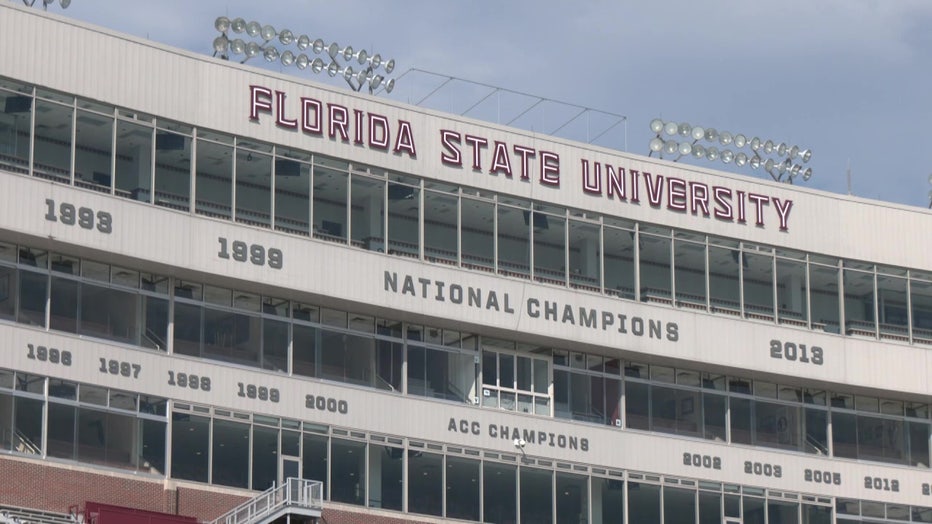Florida State sues ACC, marking first step towards departure of conference
TALLAHASSEE, Fla. - FSU voted unanimously to sue the Atlantic Coast Conference on Friday to try to leave the conference before their contract is up in 2036 and potentially avoid paying what the lawsuit describes as a ‘withdrawal penalty' of $130 million.
Three weeks after the Florida State University Seminoles became the first undefeated Power Five championship team to be left out of the college football playoff, the university's board of trustees met virtually at 10 a.m. on Friday.
University leaders have made their dissatisfaction known regarding Florida State's standing in the ACC. However, an exit from the conference would be anything but easy.
READ: Florida AG launches antitrust investigation into FSU football playoff snub
One key issue is revenue distributions, in which the ACC lags far behind the SEC and Big Ten conferences. That gap is likely to widen in the future as new media rights deals kick in for the latter two, while the former is locked into a deal with ESPN that still has more than a decade remaining.

File: Florida State University
One reason university leaders said they were upset with the conference, although there are many, is that FSU only gets about $30 million from their TV deal, contrasted with other conferences, like the SEC, which see their schools get upwards of $60 million.
Trustees said they have been working on this for a year and that it is a difficult but necessary move.
"It's one thing to fundraise and make up $7 million. It's another entirely to annually make up over $30 to $40 million," FSU Board of Trustees Chair Peter Collins said. "As an institution, FSU cannot be expected to sit idly by while this gap grows. Or, as one of the other athletic directors in the conference said earlier this year, Stop marking, pay your exit fee and wait 13 years for your grant of rights to be up. I think everybody involved at Florida State expects much more from this board than to follow that advice."
The university's lawyer says the withdrawal penalty is illegal because it doesn't match the harm FSU would cause by leaving.
To leave, FSU would have to formally challenge the ACC's grant of rights, a step that has never been taken and which would likely result in an ugly legal dispute. From there, the university would have to pay an exit fee of roughly $120 million.
READ: DeSantis pledges $1 million for any litigation arising from Florida State playoff snub
FSU President Richard McCullough said the lawsuit is the only "way to maximize our potential as an athletics department."
Trustee Drew Weatherford, who played quarterback at FSU, said the media-rights deal isn’t anything "that fans want, alumni want, or frankly, even the conferences want, for that matter."
"All we're looking for is an equitable, competitive environment, where teams that are competing for a championship are waking up and playing by the same rules," Weatherford said. "And, that's just frankly not the environment that we're currently in."
The College Football Playoff Committee said the infamous FSU snub came down to the fact that quarterback Jordan Travis was injured. Instead, the Seminoles will play 6th-ranked Georgia in the Orange Bowl on December 30.
The earliest they could leave the ACC is probably still several years away. The ACC released a statement shortly after the meeting, asserting that they think they're in the right.
"Florida State’s decision to file action against the Conference is in direct conflict with their longstanding obligations and is a clear violation of their legal commitments to the other members of the Conference. All ACC members, including Florida State, willingly and knowingly re-signed the current Grant of Rights in 2016, which is wholly enforceable and binding through 2036."
The Power 5 conferences are the ACC, Big Ten, Big 12, Pac-12 and Southeastern Conference. But the Pac-12 has been decimated by the upcoming exits of almost all of its members. As part of the changes, the ACC is adding Stanford, California and Southern Methodist University.
Florida State isn’t the only ACC school to question the grant of rights.
Media reports indicate officials with Clemson, Miami, North Carolina, North Carolina State, Virginia and Virginia Tech have made similar overtures.
The News Service of Florida contributed to this report.


